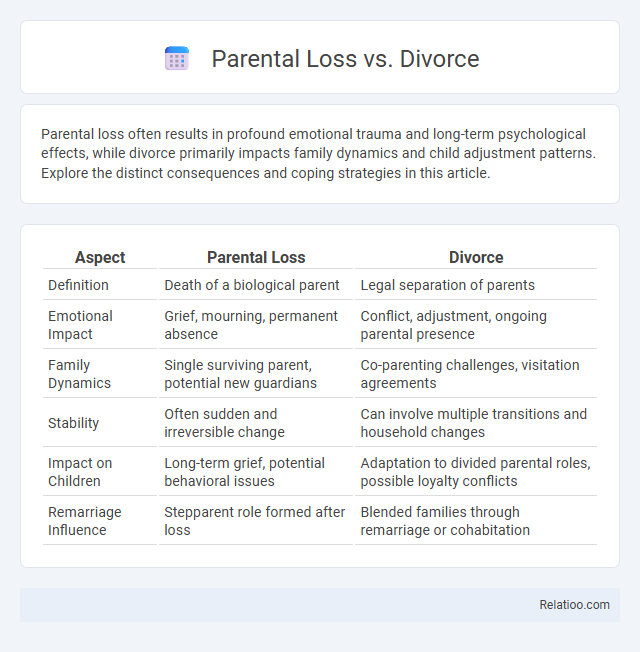Parental loss often results in profound emotional trauma and long-term psychological effects, while divorce primarily impacts family dynamics and child adjustment patterns. Explore the distinct consequences and coping strategies in this article.
Table of Comparison
| Aspect | Parental Loss | Divorce |
|---|---|---|
| Definition | Death of a biological parent | Legal separation of parents |
| Emotional Impact | Grief, mourning, permanent absence | Conflict, adjustment, ongoing parental presence |
| Family Dynamics | Single surviving parent, potential new guardians | Co-parenting challenges, visitation agreements |
| Stability | Often sudden and irreversible change | Can involve multiple transitions and household changes |
| Impact on Children | Long-term grief, potential behavioral issues | Adaptation to divided parental roles, possible loyalty conflicts |
| Remarriage Influence | Stepparent role formed after loss | Blended families through remarriage or cohabitation |
Understanding Parental Loss and Divorce
Understanding parental loss and divorce involves recognizing the unique emotional impacts each situation brings to a child's development and mental health. Parental loss, often through death or separation, can lead to feelings of abandonment, grief, and long-term psychological effects, while divorce typically introduces changes in family dynamics, routine instability, and potential conflict exposure. Your awareness of these distinctions is crucial in providing appropriate support and fostering resilience in affected children.
Emotional Impact on Children
Parental loss through death, divorce, or separation each uniquely affects a child's emotional well-being, often triggering feelings of abandonment, confusion, and grief. Children experiencing parental loss may struggle with anxiety, depression, and attachment issues, with the severity influenced by factors such as age, support systems, and coping mechanisms. Research indicates that the stability of the caregiving environment and open communication significantly mitigate negative emotional consequences, fostering resilience and healthy adaptation in children facing these challenges.
Grieving vs. Adjusting: Key Differences
Parental loss often triggers deep grieving as you confront the permanent absence of a loved one, whereas divorce primarily involves adjusting to changes in family dynamics and roles. Grieving after parental death typically involves processing finality and grief stages, while divorce requires adapting to new routines, co-parenting, and emotional shifts. Understanding these distinctions helps tailor support strategies to your specific emotional and psychological needs during these life transitions.
Long-term Psychological Effects
Parental loss, divorce, and general loss each present unique long-term psychological effects, with parental loss often linked to increased risks of depression, anxiety, and attachment disorders due to the permanent absence of a caregiver. Divorce can trigger prolonged emotional distress, including behavioral issues in children and challenges in forming trust-based relationships, influenced by family structure changes and potential parental conflict. Loss from other causes may result in varied psychological responses, but studies show that unresolved grief and trauma intensity can significantly impact mental health outcomes over time.
Parental Relationships After Separation or Loss
Parental loss through death, divorce, or separation profoundly affects children's emotional security and attachment development. After separation or loss, maintaining stable parent-child relationships requires consistent communication, emotional support, and cooperative co-parenting to mitigate trauma impacts and promote resilience. Research highlights that the quality of parental involvement post-divorce or bereavement is crucial in safeguarding children's long-term psychological well-being and social adjustment.
Role of Support Systems
Parental loss, divorce, and other forms of loss uniquely affect emotional well-being, making the role of support systems crucial for recovery. Strong support networks, including family, friends, and counseling services, provide stability and help you navigate grief, confusion, and adjustment challenges. Effective support systems facilitate healing, resilience, and healthy coping mechanisms during these difficult transitions.
Academic and Social Consequences
Parental loss, divorce, and general loss each uniquely impact children's academic performance and social development, with parental loss often resulting in more severe emotional distress leading to decreased school engagement and peer relationship challenges. Divorce can cause academic decline and social withdrawal due to family instability and altered living arrangements, while general loss may lead to temporary setbacks but typically less intense long-term effects. Research highlights that children experiencing parental loss tend to have higher risks of anxiety, depression, and behavioral problems, which negatively influence both academic achievement and social integration.
Resilience and Coping Strategies
Parental loss, divorce, and general loss each uniquely impact resilience and coping strategies, with parental loss often triggering profound grief requiring tailored grief counseling to rebuild emotional stability. Divorce challenges coping mechanisms by necessitating adaptation to changing family dynamics and fostering communication skills to promote emotional resilience in children. Both situations benefit from structured support systems, cognitive-behavioral interventions, and community resources that strengthen adaptive coping and long-term psychological well-being.
Communication with Children about Change
Communicating with children about parental loss, divorce, or any significant change requires honesty, empathy, and age-appropriate language to help them process emotions effectively. Your approach should prioritize creating a safe space where children feel heard, supported, and reassured despite the upheaval. Consistent, open dialogue encourages trust and helps children adapt to new family dynamics while minimizing confusion and anxiety.
Professional Help and Therapeutic Interventions
Professional help plays a crucial role in addressing the emotional challenges associated with parental loss, divorce, and other losses by providing tailored therapeutic interventions such as grief counseling, cognitive-behavioral therapy, and family therapy to support your mental health. Therapeutic approaches focus on processing complex emotions, rebuilding resilience, and developing coping strategies to promote psychological recovery and well-being. Accessing specialized professionals ensures personalized care that meets your unique emotional needs during these life-altering experiences.

Infographic: Parental Loss vs Divorce
 relatioo.com
relatioo.com